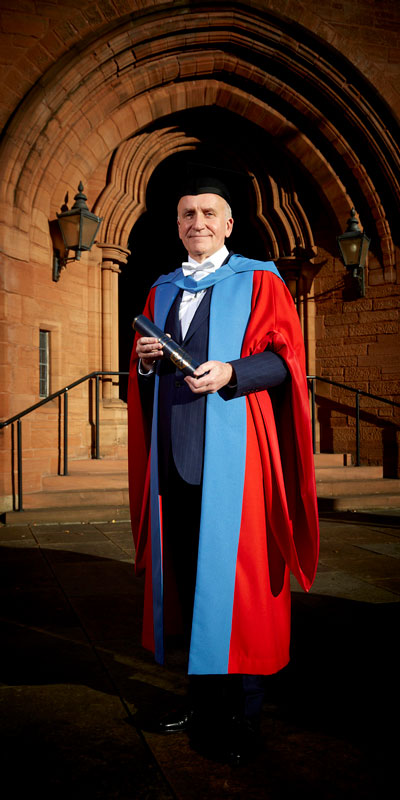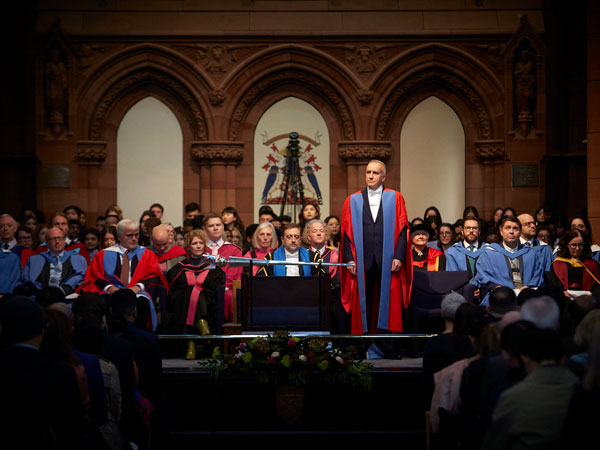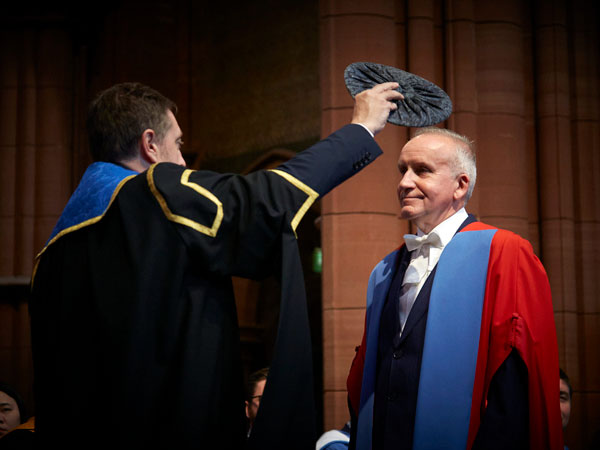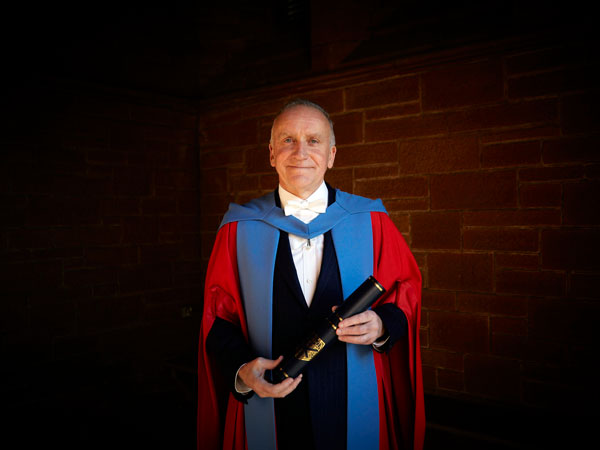
Honorary DegreesJohn Scally
Meet John
Dr John Scally is widely regarded by his peers as one of the leading librarians in Europe. With more than 25 years of experience working in libraries, museums, and galleries, he was The National Librarian and Chief Executive of The National Library of Scotland (NLS), which plays a leading role in Scotland's cultural life.
The National Library of Scotland
The National Library of Scotland is a legal deposit library, and by law, all published works must be submitted to it, that traces its origin to the late 17th century making it one of the oldest libraries in the world. It's one of the largest libraries in the UK and is one of the leading research Libraries in Europe. It houses and archives the papers of leading figures in Scottish public life and among its manuscript collections are important pieces by Charles Darwin, a copy of the Gutenberg bible, and a Shakespeare Folio among its 24 million items.
The National Library of Scotland is a cultural institution of global significance and its John Murray collection, for example, contains letters and correspondence related to the publication of important authors such as Jane Austin, Byron and Herman Melville, among many others. It also had an important partnership with the US Library of Congress and holds one of the largest collections of American Federal Publications outside America.
Major achievement
To head and lead such an important institution is a major achievement in itself and John was one of the top six major librarians in the UK, and among the top fifty in Europe, in terms of the cultural significance and size of collections he was managing. He held that position from 2014 until he retired in October 2021.
Going digital
Dr Scally is regarded as having provided transformative strategic leadership in adapting The National Library of Scotland to the digital age and the needs of the 21st century, increasing accessibility, and making the collections of the NLS more representative of Scottish society as a whole.
Watch
Watch John receive his Honorary Degree, and hear what he had to say to our graduands at their graduation ceremony.
We caught up with John ahead of receiving his Honorary Degree.
Congratulations! How do you feel about receiving your honorary degree today?
Absolutely delighted. Having recently retired, it feels like a very fitting conclusion to my professional career, especially given that I graduated from Strathclyde in 1987 with an honour’s degree in History and English. I’ve frequently said that ‘Strathclyde made me;’ in other words, it reshaped my thinking, helped me mature and encouraged me to set high expectations for the future. I was the first in my family to go to university, but Strathclyde took that in its stride.
Why did you decide to become a librarian?
I fell into it. Unlike many librarians I spoke to over the years, who spoke misty-eyed about organising their childhood books in alphabetical order, I wanted to be Spiderman, then a School Teacher. My history tutor at Strathclyde, Dr Simon Adams, suggested I study for a PhD, and I ended up at Cambridge. For the next three years I spent lots of time in libraries and archives doing research. It was that experience which planted the idea in my mind. Then I had a bit of luck, applied for a library job and to my surprise, got it.
What do you love about it?
I got into libraries in the early stages of the internet/world wide web and digitisation which was disruptive and exciting in equal measure. The idea of looking anew at books, manuscripts and archives as digital entities was a thrilling prospect. I was fortunate early in my career to be put in charge of buying rare books, an activity that I relished. I also loved doing exhibitions and curated quite a few over the years, such as on Robert Louis Stevenson, William Drummond of Hawthornden and Charles Darwin. As my career progressed, I got more into managing libraries, but kept my hand in with special collections acquisitions and fundraising. If I’m being honest, I also liked (loved may be a tad strong) being in charge and that partly propelled me to my final job as National Librarian.
What's your favourite book?
That is the most difficult question to ask a librarian, or an academic for that matter. But for me it’s easy. I had many wonderful teachers at school and university, but Mrs Anderson, my English teacher at secondary school, believed in me when even I didn’t. During one of her classes I told her how bored I was reading the work of all these dead writers. Next day she gave me a paperback copy of The Catcher in the Rye by J.D. Salinger and said, "read this." It blew me away. I handed the book back to her a few days later after class and told her how much I loved it. She told me the book was mine now and to keep it. I still have it almost fifty years later. It is one of my most treasured possessions and my favourite book.
What’s the most important thing you’ve learned throughout your career?
I guess it was about developing your personal resilience and recognising good advice and taking it. Those might sound pretty obvious; however, it took me a while to catch on just how important they were, especially for someone like me who was quite headstrong and opinionated. I worked hard at both of these things and feel that I got better at a lot of aspects of my job as a consequence.
What’s been your favourite part of your career?
I suppose being appointed the National Librarian in 2014. Even my mother was impressed when I visited to tell her the news. I remember she paused ‘Coronation Street’ on the television and said, ‘that sounds like a big deal.’ As a Scot, it just seemed like a special place to get to. I thoroughly enjoyed my time in the job.
What do you enjoy doing in your spare time?
Well, as I said, I’ve recently retired so I expect you could say I have loads of spare time. In actual fact, I keep myself pretty busy. I’ve finished two books since retiring (one with a retired journalist), and I am working on a third. Even so, I have much more time to relax, to go for country walks (we’ve recently moved out of the city) and indulge my favourite pastimes, such as reading books, browsing books, and buying them.
What advice do you have for our graduates today?
It’s far easier to move from one job to another job, rather than leave a job with nothing to go to. That is incredibly risky, unless you are convinced your skills are fairly unique in the job market. I have always kept my CV up-to-date, even if I wasn’t looking for a job, because it allowed me to reflect on where I had got to, what skills and experience I had gained and, crucially, where the gaps were. You have to work for a long time in your life, so try to enjoy whatever you do and commit to it.



